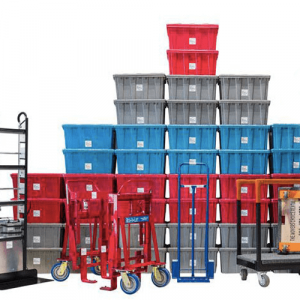Plastic pallets have become an important part of the supply chain industry. These pallets offer many benefits over traditional wooden pallets, making them a preferred choice for many businesses. Whether you are a buyer or a business owner looking to add plastic pallets into your operations, this complete and thorough summary will provide you with all the necessary information to make smart choices.
Benefits of Plastic Pallets
These pallets offer several advantages that make them a superior choice compared to wooden or metal pallets:
- Durability: Highly durable and can stand up to rough handling, extreme temperatures, and harsh weather conditions. They will not rot, harbour pests, and chemicals, offering a longer life compared to other pallet materials.
- Sanitation: Easy to clean and sanitize, making them ideal for industries that require strict hygiene standards. Unlike wooden pallets, plastic pallets do not absorb liquids or harbor bacteria, lowering the risk of contamination.
- Weight: Lightweight, which reduces costs and makes them easier to handle. This weight advantage also allows for better fuel efficiency and reduced carbon emissions during transport.
- Consistency: Unlike wooden pallets that can vary in dimensions and quality, offering a consistent size, shape, and weight. This consistency makes them ideal for automated systems and ensures compatibility with various handling equipment.
- Sustainability: Can be recycled and reused, reducing the environmental impact associated with single-use pallets. They are made from recyclable materials and can contribute to a circular economy by being recycled into new plastic products.
Best Practices for Storing and Handling Plastic Pallets
Proper storage and handling of plastic pallets are crucial to maintain their longevity and maximize their benefits. Here are some best practices to consider:
1. Storage
When storing plastic pallets, it is important to:
- Stack them correctly, ensuring that the load is evenly distributed to avoid unnecessary stress on individual pallets.
- Store them away from direct sunlight and extreme temperatures to prevent warping or potential damage.
- Implement a proper inventory system to track the condition and location of each pallet.
2. Handling
To ensure safe and efficient handling:
- Train employees on proper lifting and stacking techniques to minimize the risk of injuries.
- Inspect pallets before use to identify any damages or defects. Damaged pallets should be fixed or replaced to prevent accidents.
- Use appropriate handling equipment, such as forklifts or pallet jacks, that work with plastic pallets.
- Avoid dragging or dropping pallets, as this can cause cracks or holes.
Plastic Pallets for Shipping
Plastic pallets offer several advantages when it comes to shipping and transportation:
- Hygiene: Plastic pallets are easy to clean, making them perfect for industries with strict hygiene standards, such as pharmaceuticals and food processing.
- International Shipping: They are exempt from the ISPM 15 regulations, which require wooden materials to be heat-treated or fumigated for international shipping. This exemption stops the need for added certifications and documentation.
- Product Protection: Plastic pallets provide better protection for products during transit. Their smooth surface reduces the risk of splinters or loose nails, stopping the potential for damage to both the product and the packaging.
- Customization: The pallets can be made with various features, such as anti-slip surfaces, RFID tags, or labeling options, to meet specific shipping requirements and enhance supply chain tracking.
- Returnable and Reusable: Many plastic pallets are designed for returnable and reusable purposes, reducing waste and offering cost savings in the long run. This makes them an environmentally friendly choice.
Australian Plastic Pallets
Plastic pallets have gained significant popularity in Australia due to their numerous benefits and suitability for diverse industries. The Australian market offers a wide range of options, prefect for specific needs and applications.
One of the key factors driving the shift to plastic pallets in Australia is the countries strict biosecurity regulations. Wooden pallets require treatment or certification to comply with the ISPM 15 regulations, which can be slow to receive and costly. Plastic pallets provide a easy alternative, as they are exempt from these requirements and can be used for local and international shipments without added certifications.
Additionally, the strength and weather-resistant construction, make them perfect for Australia’s diverse climate. They can stand up to extreme temperatures, humidity, and exposure to sunlight without deteriorating or warping. These benefits are particularly useful for industries operating in hot and humid regions.
The sustainability aspect of plastic pallets also aligns with Australia’s focus on a better environment. Many Australian companies are seeking eco-friendly solutions, and plastic pallets offer a viable option. The ability to recycle and reuse ensures a reduction in single-use packaging waste and provide a more sustainable supply chain.
Conclusion
Plastic pallets have changed the way goods are stored, transported, and handled in various industries. Their strength, sanitation, weight advantages, and sustainability make them the best choice for buyers worldwide. By following best practices for storage and handling, companies can grow with the benefits of these pallets while making sure safe and smart operations.





